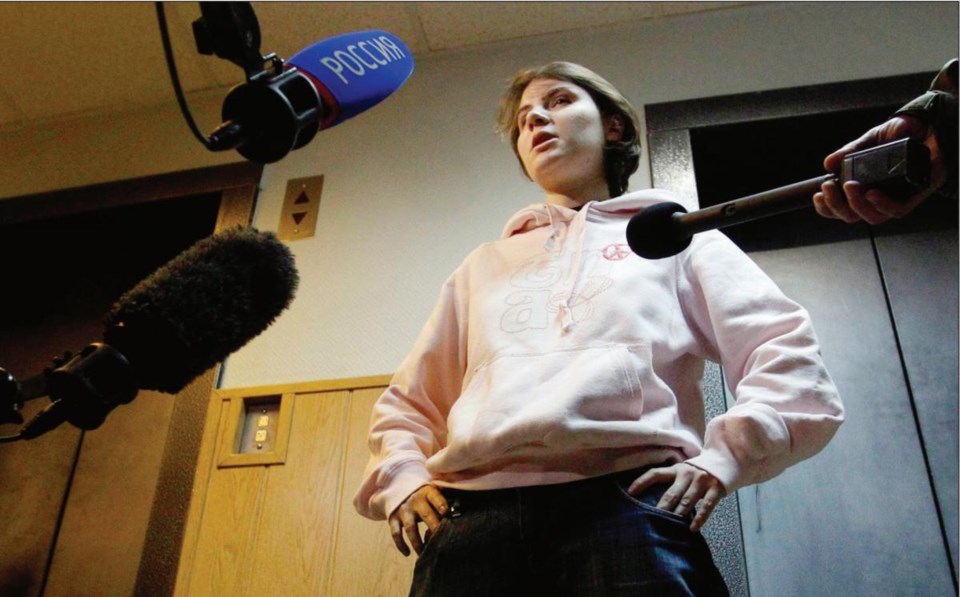Two members of the Russian feminist punk protest band Pussy Riot are sitting in jail for protesting in a church against Vladimir Putin.
Meanwhile, for $19.95, plus shipping, fans of the U.S. singer Madonna can order a 100 per cent cotton "Pussy Riot" T-shirt, featuring the band's logo of a woman in a red mini dress and ski mask, with a raised fist and an electric guitar.
First came the battle for freedom; now comes the battle for merchandise. Three months after the end of a trial that shot them to world fame, band members say they are fighting to stop anyone cashing on its multi-million-dollar brand.
Experts say the Pussy Riot name is worth a fortune. If they were interested, the band's members could get rich from tours, films, documentaries and recording contracts.
But it is anathema to the women who, dressed in garish masks, dresses and mismatched tights, burst into a Russian Orthodox cathedral last February and performed a "punk prayer" calling for the Virgin Mary to chase away Putin.
"We will never allow the brand to be registered," said Yekaterina Samutsevich, the only one of three jailed band members so far to go free, who announced on her release that she will represent the interests of the two still in prison. "We've always said our band would never be commercial. To an extent it was created to fight commercialism."
Samutsevich, 30, was convicted in August of hooliganism motivated by religious hatred, along with Nadezhda Tolokonnikova, 23, and Maria Alyokhina, 24.
Samutsevich's sentence was suspended and she was freed on appeal; Tolokonnikova and Alyokhina have started two-year jail terms. Amnesty International calls them prisoners of conscience.
The band is now so well known in the West that a character wore a T-shirt saying "Free Pussy Riot" in a recent episode of South Park, the satirical U.S. sitcom.
"Over the next two years the brand could feasibly generate over $3 million in gross revenue, with a net income of around $2-2.5 million," estimated Kevin Drost, engagement manager for marketing consultancy Prophet Brand Strategy. He cited potential revenue from touring, merchandise, digital sales, publishing, speaking fees and film and book rights.
For outsiders, including Western celebrities who have adopted the jailed women's cause, selling merchandise with the Pussy Riot logo is a way to raise money to help them.
Madonna has been one of their most vocal backers.
She infuriated the Russian authorities by speaking out on behalf of the band at a concert in Moscow, performing with "Pussy Riot" written on her back in ink, and wearing one of the band's trademark ski masks. A Putin aide showed the Kremlin's disdain, calling her a "whore" on Twitter.
The U.S. singer now offers Pussy Riot T-shirts for sale on her website and at her concerts. She says she is sending the money she raises to help pay for the band's legal defence.
Samutsevich said she hadn't seen a penny and knew nothing of the details of the arrangement.
"Nobody agreed with me, Nadia or Masha," Samutsevich said, using affectionate names for Tolokonnikova and Alyokhina. "The only thing I can say is we will never sell T-shirts with our images on them. It's not us that's doing it."
She was trying to find out where proceeds from Madonna's sales were going, she said, adding that she would not be against it, as long as the cash is used to help "anyone who suffered from repressions as a result of their creative activity."
Madonna's spokeswoman, Liz Rosenberg, said the singer's staff had been "in direct contact with the jailed and free members of Pussy Riot" and insisted that Madonna had permission to sell the merchandise.
"I believe there is a dispute currently going on with different legal representatives which may account for some confusion," she said. "One hundred per cent of the authorized merchandise on Pussy Riot that Madonna sells at her shows goes toward their legal fees and goes to wherever the members have asked it be sent to."
Icelandic singer Bjork also contacted Pussy Riot to discuss selling T-shirts to help raise money for legal fees, said her manager, Derek Birkett. Those discussions are on hold because band members "are now having second thoughts about the commercialization of the name and the idea," Birkett said.
Pussy Riot has always been more about protest than music. The band has never made any official recordings and does not have a recording contract.
Because its brand name isn't registered as a trademark, members have no control over who uses it. The band doesn't even have an official lineup: it says anyone can join. At any given moment it has 10 to 20 members.
"The brand is not registered, which means anyone can use the name. It has no copyright either, because it's not a product, not a song.
And the name is so famous, it can really be used by anyone," said Taras Dzerkach, partner at German law firm Beiten Burkhardt.
While the band members were in jail, Tolokonnikova's lawyer, Mark Feigin, tried to register the Pussy Riot brand name with Russia's authorities as the property of a film company owned by his wife.
Tolokonnikova issued a statement denouncing the move from the prison colony where she is serving her sentence in Mordovia, 400 kilometres southeast of Moscow.
"Stop the brand showdown! Stop the registration of the brand! Stop the madness," she said.
"I'm deeply disgusted by the financial and branding discussion. Money is dust. If someone needs it - take it.
... I need freedom, but not for me - for Russia."



